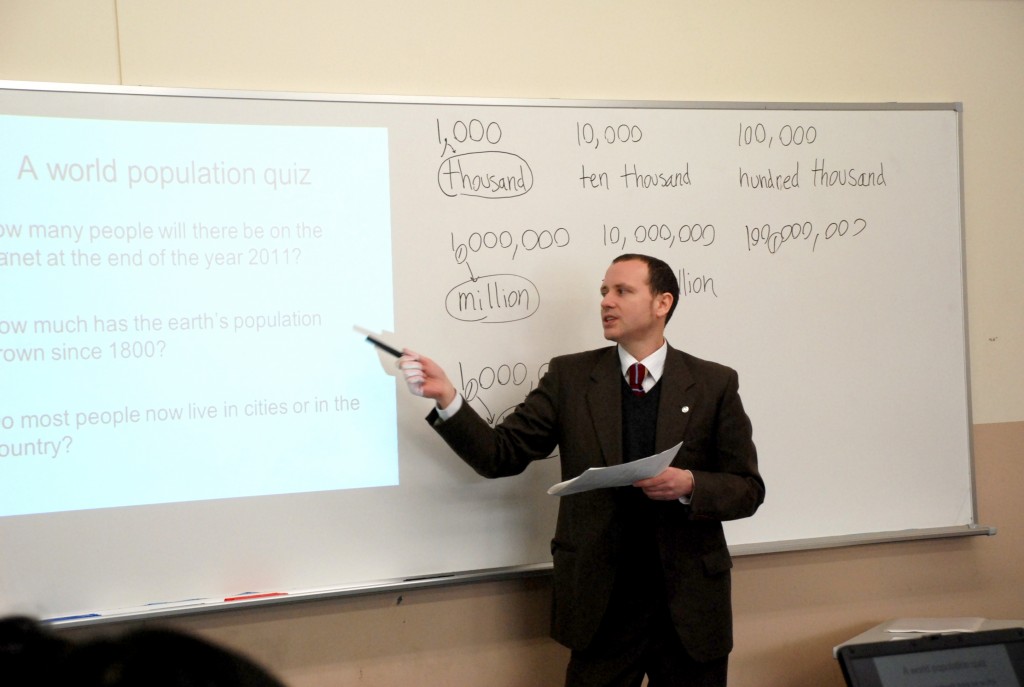On Becoming A Rule Comparer – Kevin Stein
I’m not really a rule breaker. In fact, I’m one of those rule making kind of teachers. Every year I start the semester off by having my students draft a set of expectations for class. I then hang this on the wall. I have a seating chart for the first week of lessons and every student must sit in their place. If for some reason a student must leave class in the middle of a lesson, I make them sign out in a special notebook I have on a chair next to the door. I like rules. They make me feel comfortable. Sometimes, I think they make my students feel comfortable as well.
Two years ago, John F. Fanselow started advising the International Course program at my school. At John’s prompting, I recorded my classes and sent him off a video. John started our discussion by asking me some questions about my entry-tasks. I’m a big fan of entry tasks. They fill up the three minutes I need to take attendance and the students get exposed to English right from the last echoes of the opening class chime. I’ve always been kind of proud of my entry-tasks.
John didn’t seem particularly impressed, and asked me to think of three benefits to leaving the first five minutes of my class unstructured. I rattled of a few reasons, but mostly just because I thought that was what was expected of me, and I wanted to move on and talk about the main part of the lesson. However, something about the whole entry-task discussion stayed with me, and a few days later I decided to see what would happen if I did leave those first five minutes of class unstructured, so instead of an entry task on the board, students came in to find nothing.
As I took attendance, I watched and listened to the students. At first the students looked at me, but when it became clear I had nothing planned, most of them started chatting. One boy put his head down and went to sleep. I caught a snippet of conversation about a movie and the weekend. A different student pulled out his vocabulary list and started studying for the big school English Word Contest. As I watched, I cut out some of the exercises from my lesson plan and started off with a quick game of Simon Says with jumping-jacks (doing jumping-jacks with Japanese students is one of the great joys of life) and running in place. I also slipped in a bit of conversation work around the immediate past; and then we spent the last 10 minutes of the lesson on some effective ways to study vocabulary, whether it’s for a big English Word Contest or not.
It would be nice if I could say this experience left me permanently changed. It would be nice to be able to say that I became the kind of flexible teacher who relies on their moment-by-moment intuition and power of observation to make good choices without relying on rules. But the truth of the matter is, I’m a rule maker. It’s my nature. I like things in their place and a place for each thing. Only, students aren’t things, and learning is a process, not a place. Since I can’t bring myself to be a rule breaker, I’ve become a rule comparer.
Since I can’t bring myself to be a rule breaker, I’ve become a rule comparer.
If I decide that my students shouldn’t use any Japanese when they are making a video to send to a classmate in Australia this week, I’ll let them use Japanese the next time we send a video letter. If I tell my students they can’t use erasers when taking dictation during a series of lessons, I’ll tell them to use their erasers freely the following week — while cringing the whole time. Then I’ll watch and see what happens. Most of the time students take what they need and make their own decisions about the best way to learn for them selves.
Maybe I’ve broken the biggest rule of all: The one that says the teacher knows best.
In a way, maybe I have become a rule breaker. Maybe I’ve broken the biggest rule of all: The one that says the teacher knows best. The one that says rules come from the front of the class, not from the needs of the students. But I’m probably being a little self-congratulatory. After all, students still have to sign in and out of my classroom, and the list of class expectations is still hanging on the wall — even if I don’t really bother to look at it very much these days.



Kevin, thanks for sharing.
The trick is that you know that you’re breaking the rules, but the students don’t.
Kevin, you’re with the biggies in this group of posts.
Nice job.
Mark in Gifu
Hello Mark,
Thanks for the comment. As a teacher of children, I’m sure you have your own set of rules to help the students stay focused and on task. So I think you’re exactly right, part of the trick of breaking the rules is doing it without disrupting the students’ sense of a safe and stable environment. Sometimes (most of the time?) that means the students aren’t really aware of the rules being broken. But even if they aren’t consciously aware of how things are different, I think that sense of freedom still works a kind of magic in the class. There’s just more room to explore and try language when the rules have been changed.
And I should probably say that every time I open the iTDi blog and see my goofy picture along side Chuck, Barbara, Steven, Scott, and John’s I feel my face turning red. I couldn’t be happier. I want to thank iTDi for the support I’ve found in the community and especially thank John for the time and care he’s shown in helping me develop as a teacher. I love teaching and iTDi has helped me keep that love strong and constant.
Kevin